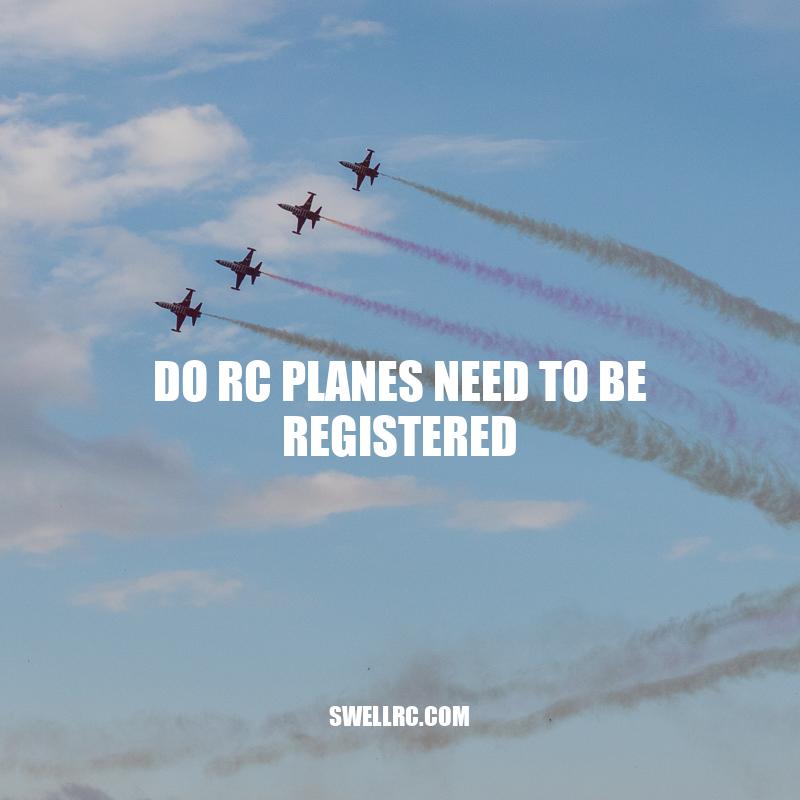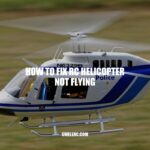Do RC Planes Need Registration: Understanding the FAA and Hobby Regulations
Radio-controlled (RC) planes are fascinating pieces of technology that are enjoyed by enthusiasts of all ages. The thrill of piloting an aircraft through the skies using a remote controller can be a fulfilling hobby. RC planes come in various sizes, shapes, and types, ranging from basic models that can be flown indoors to sophisticated aircraft that can reach high speeds and altitudes. For beginner hobbyists, RC planes can be purchased as kits that can be assembled and customized based on personal preferences. More skilled hobbyists can design and build their own RC planes from scratch, which can be a fulfilling and rewarding experience. However, as with any new hobby, there is always a question of legal requirements and regulations when it comes to flying RC planes. One common question is whether or not RC planes need to be registered, and this article aims to address this question.
FAA Registration Rule
In December 2015, the Federal Aviation Administration (FAA) introduced a regulation that requires drones to be registered before they can be flown legally. This regulation was put in place to regulate the growing number of drones and to ensure safety measures are in place. However, RC planes do not fall under this regulation as they are not classified as drones. Below are key points to consider about RCs and FAA regulations:
- FAA registration is only required for drones weighing more than 0.55lbs, including payloads
- RC planes are not classified as drones and thus do not need to be registered with the FAA
- This rule only applies to US residents flying drones in the US; non-US residents don’t need to register their drones with the FAA
How do I register with the FAA?
To register with the Federal Aviation Administration (FAA) in the United States, follow these steps:
- Go to the FAA’s registration website at faadronezone.faa.gov
- Click on “Register” to create an account
- Provide personal information, including your name, address, and email address
- Select what type of drone you’ll be flying
- Pay a $5 fee and receive a unique registration number
Note that if you’re operating a drone for commercial purposes, you’ll need to get a Remote Pilot Certificate from the FAA. More information on that process can be found on the FAA’s website.
Hobby Regulations and their Impact on RC planes
The hobby of RC plane flying is governed by hobby regulations set by the Academy of Model Aeronautics (AMA) in the United States. These regulations ensure that RC plane enthusiasts operate within certain guidelines to ensure safety for themselves and others around them. Below are some key hobby regulations and how they impact RC planes:
| Regulation | Explanation |
|---|---|
| Flying location | Flying RC planes is permitted only in designated AMA flying fields or in any other pre-approved location. RC planes are not permitted to be flown in parks, sporting or open areas unless for specific events or circumstances. |
| Line of Sight | RC planes must be flown within the operator’s line of sight at all times. The AMA recommends that the operator should use a spotter if operating First-Person-View or FPV equipment while flying an RC plane. |
| Age Restrictions | The AMA imposes age restrictions for RC plane operation. Children under 13 years old are only allowed to fly under direct supervision while supervised new pilots can be as young as eight years old. |
It’s worth noting that although these guidelines are not laws, they are put in place to protect the hobbyist, nearby citizens, and the planes themselves. Adhering to these guidelines ensure continued safe and responsible operation of RC planes for both hobbyists and the surrounding community.
What are the rules for model aircraft?
- All model aircraft must be flown within line of sight of the operator.
- Do not fly above 400 feet above the ground level.
- Avoid flying near any airport or in restricted airspace.
- Ensure you are operating in accordance with the FAA regulations and provisions.
For more information, visit the FAA’s website for recreational flyers or download the B4UFLY mobile app.
Rules for Flying RC Planes Near Airports
As fun as flying RC planes is, it’s crucial to exercise caution, especially when it comes to flying near airports. Here are some of the rules and restrictions set by the FAA for flying RC planes near airports:
- Stay 5 miles away from an airport
- Notify the local airport operator or control tower prior to flying
- Fly no higher than 400 feet above the ground
- Give way to all manned aircraft
- Avoid flying in restricted areas such as military or prohibited airspace
- Do not fly near emergency response efforts
Breaking any of these rules can result in fines, imprisonment, or both. It’s important to exercise caution when flying, especially when close to airport spaces where other aircraft may be flying. Those flying without knowledge of such limitations, can find the contact information for nearby airports for notification on the FAA website.
How Close to an Airport Can I Fly My RC Plane?
According to the Federal Aviation Administration (FAA), flying a remote control (RC) plane near an airport is not allowed. The FAA requires that RC enthusiasts follow specific guidelines to fly their planes safely and responsibly.
Here are some FAA guidelines for flying RC planes:
- Do not fly your RC plane within 5 miles of an airport.
- Do not fly your RC plane higher than 400 feet.
- Keep your RC plane in sight at all times.
- Do not fly your RC plane over people or stadiums.
- Check for any temporary flight restrictions issued by the FAA in your area before flying.
By following these guidelines, you can ensure the safety of yourself, your RC plane, and others.
For more information on flying RC planes, visit the FAA website.
Conclusion
While there is no specific FAA registration requirement for RC planes, it is important to ensure the safety of the public and for the hobby to remain accessible to enthusiasts. By following the AMA’s hobby regulations and the FAA’s rules for flying near airports, hobbyists can enjoy the excitement of flying RC planes without causing any harm or disturbance to anyone near the area. It is also important to note that as technology advances, regulations may change, and it is important to stay informed and up-to-date on any changes or new requirements. In closing, whether you are an experienced RC plane enthusiast or just starting out, with a bit of care and following the rules and regulations, anyone can safely enjoy the hobby of RC plane flying without any legal issues.



